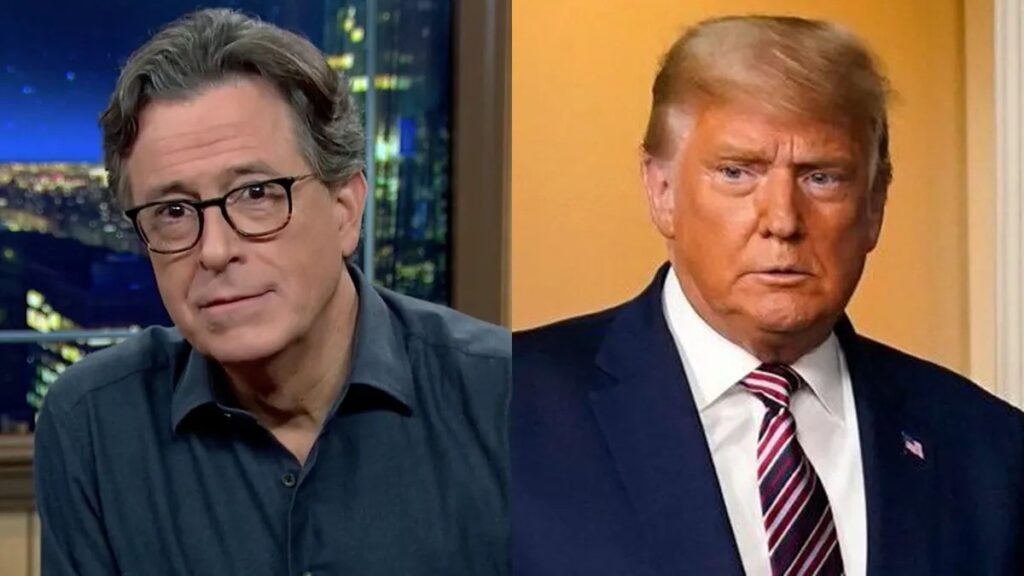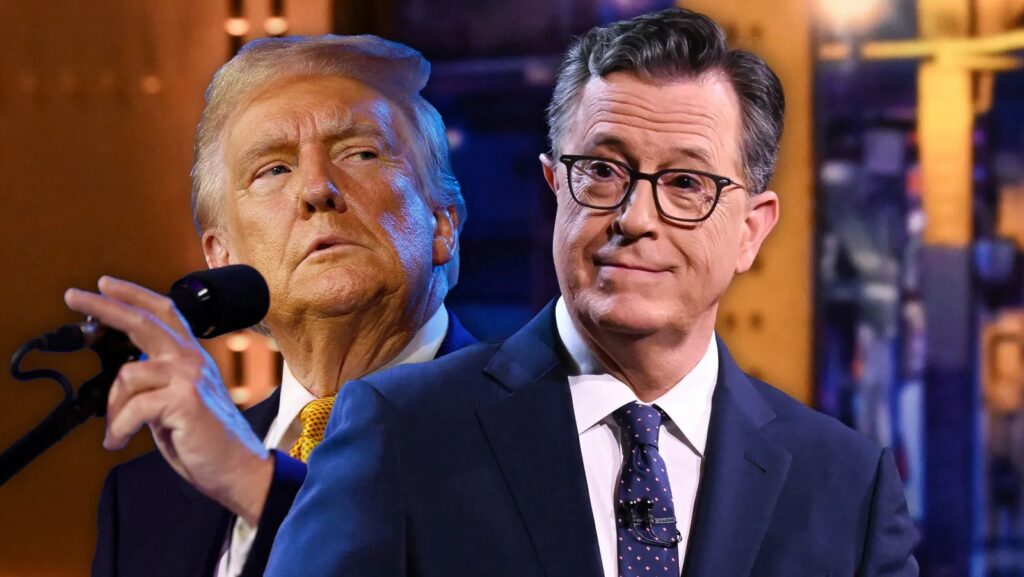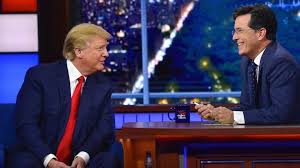Stephen Colbert returned to his desk on The Late Show with fire in his heart and a pointed message aimed directly at his longtime political adversary, former President Donald Trump. In his first appearance since the shocking announcement that The Late Show will come to an end in May 2026, Colbert didn’t waste time easing back into late-night banter. Instead, he took the gloves off, responding in kind to a gleeful jab Trump had posted on Truth Social. Trump’s post read, “I absolutely love that Colbert got fired. His talent was even less than his ratings.” For someone like Colbert—who’s made a career out of satirizing the powerful—this was more than an insult; it was a call to arms.
Colbert, ever the craftsman of deadpan zingers and theatrical delivery, paused during his July 21 monologue and invited the audience to experience his rebuttal through what he cheekily called the “eloquence cam.” With the camera zoomed into his face, and the studio audience still chanting his name, Colbert responded with a brutal, three-word retort: “Go (expletive) yourself.” The moment—delivered with perfect comedic timing—was more than just a comeback. It was Colbert doing what he’s always done best: slicing through political noise with razor-sharp wit, and refusing to let his voice be diminished by the very figures he’s spent years critiquing.
But Colbert wasn’t done. Reading further into Trump’s post, he reached the line where the former president wrote, “I hear Jimmy Kimmel is next.” Colbert leaned into the theater of it all, responding with a martyr’s flair: “Nope, absolutely not, Kimmel. I am the martyr. There’s only room for one on this cross, and I’ve gotta tell you, the view is fantastic from up here. I can see your house!” The audience erupted, not just at the joke, but at the sense that Colbert was stepping into this next phase with his sense of humor intact, no matter how surreal or bitter the circumstances.
For viewers who’ve followed The Late Show through its Colbert years, the news of its cancellation felt like a gut punch. Just a few days earlier, Colbert had broken the news with a mix of sadness and honesty, telling fans, “It’s not just the end of our show; it’s the end of The Late Show on CBS.” He added, “I’m not being replaced. This is all just going away.” It was a stark admission, highlighting not just the personal end of his era, but a broader statement about the changing face of television.
The reaction from CBS’s parent company, Paramount Global, was swift and oddly sentimental. In a statement issued after Colbert’s announcement, executives called him “irreplaceable” and confirmed that the entire Late Show franchise would retire alongside him. The statement emphasized that the decision was “purely a financial one,” due to a challenging late-night landscape, and “not related in any way to the show’s performance, content, or other matters happening at Paramount.” Yet, for many fans and media insiders, the explanation didn’t sit right. The timing of the cancellation came suspiciously close to another firestorm involving Colbert and Paramount—one that included, yes, Donald Trump.
In the days leading up to the show’s cancellation, Colbert had criticized Paramount for settling a defamation lawsuit with Trump. The settlement, according to Colbert, wasn’t just a legal maneuver—it was, in his words, “a big fat bribe.” The company had agreed to pay $16 million toward what was labeled as Trump’s future presidential library. Colbert wasn’t buying it. He accused Paramount of using the settlement as a political favor to gain goodwill from Trump’s allies in the FCC, hoping to smooth over regulatory hurdles ahead of its $8.4 billion merger with Skydance Media. The implication was bold and scathing: Paramount was selling out its values—and possibly even its employees—for business favors.

Colbert didn’t mince words in his criticism, and it was this kind of outspoken commentary that fans have come to admire. In an industry increasingly governed by corporate interests, Colbert’s willingness to challenge not only political figures but also his own network’s decisions felt almost revolutionary. But it’s also what led many to question whether his firing truly was “just a business decision.” Whether by coincidence or design, the cancellation followed almost immediately after Colbert’s takedown of Paramount’s legal deal with Trump. And in the context of Trump’s subsequent gloating on social media, the entire saga took on an air of political theater—one that might have belonged on Colbert’s own stage.
For Trump, this was yet another opportunity to revel in the perceived demise of his critics. His Truth Social post didn’t stop at Colbert. He added more fuel to the fire, writing, “Greg Gutfeld is better than all of them combined, including the Moron on NBC who ruined the once great Tonight Show.” It was a typical Trumpian flourish—part personal grudge, part performative media critique. His championing of Gutfeld, a conservative-leaning host on Fox News, is part of a longer pattern of the former president promoting right-wing alternatives to traditional late-night programming, which he often paints as biased and elitist.
But Gutfeld, despite his ratings success on cable, doesn’t command the same kind of cultural clout that someone like Colbert does. While Gutfeld may preach to a devoted choir, Colbert’s humor reached across the political spectrum—even when it stung. Over the years, Colbert became known not just for mocking Trump, but for humanizing political satire. He used it to expose hypocrisy, illuminate truth, and comfort a nation that often felt chaotic and divided. He wasn’t just telling jokes—he was offering perspective.
His rivalry with Trump, in many ways, helped redefine The Late Show as a cornerstone of modern political satire. After initially struggling in the ratings post-David Letterman, Colbert found his voice—and his audience—by directly challenging the Trump administration night after night. From mocking Trump’s Twitter rants to parodying his public gaffes, Colbert became a nightly source of resistance, a comedian-turned-therapist for a public overwhelmed by news cycles.
But as much as Colbert’s legacy is tied to his critiques of Trump, his departure represents a broader shift in how people consume comedy and news. Traditional late-night programming has seen significant erosion in viewership in recent years. With younger audiences turning to YouTube clips, TikTok, and streaming platforms, the need for a network-anchored show at 11:30 p.m. feels increasingly obsolete. CBS, like other networks, is being forced to adapt, often in ways that leave behind even their most beloved voices.
Still, there’s something undeniably poignant about the way Colbert is choosing to go out. He’s not retreating quietly or masking his opinions for the sake of decorum. If anything, he’s doubling down—leaning into the satirical persona that made him a household name. His defiance in the face of criticism, especially from someone as polarizing as Trump, is emblematic of a man who knows his time may be limited, but his platform still matters. When he says, “I’m the martyr,” it’s half a joke, half a truth. He’s shouldering the burden of an industry in flux, an era fading, and a culture that still desperately needs the kind of comedy that holds power accountable.
As Colbert said, with dry theatricality and a glimmer of mischief, “The view is fantastic from up here. I can see your house.” It’s a line that resonates not just as a jab at Trump, but as a metaphor for Colbert’s entire career. From his early days on The Colbert Report to his final days on The Late Show, he’s maintained a perch above the fray—watching, commenting, laughing, and always reminding viewers that no matter how absurd reality gets, there’s still power in telling the truth with a punchline.

In the months leading up to his final broadcast, Colbert will undoubtedly continue to push boundaries, take risks, and, yes, throw punches at the figures who wish to see him silenced. Whether or not The Late Show ends on his own terms, Stephen Colbert is making damn sure his last chapter is as loud, funny, and fearless as the ones that came before it. In a world that increasingly values soundbites over substance, that kind of ending feels like something worth applauding.



